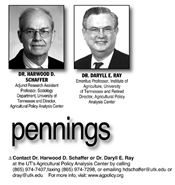|
Food Sovereignty

In writing this column, we have indicated our support for the idea of food sovereignty as a part of our analysis of various trade issues. We have talked about food sovereignty as the right of any nation to determine its own agricultural policy, including farm income supports, as long as that country does not export agricultural products at a price below the full cost of production. The corollary is that no country has to open its agricultural markets to imports from lower cost countries. They may, however, import agricultural products to make up for shortfalls in domestic production.
Recently, a colleague of ours, John Ikerd, a retired University of Missouri professor published an article, “The Economic Pamphleteer: A “Green New Deal’ for Farm and Food Policy,” in the Journal of Agriculture, Food Systems, and Community Development” (https://tinyurl.com/yyz3zlee). In that article he examines the concept of food sovereignty.
Part of the article title, “The Economic Pamphleteer,” is explained at the bottom of the first page in which Ikerd writes:
Why an Economic Pamphleteer? Pamphlets historically were short, thoughtfully written opinion pieces and were at the center of every revolution in western history. I spent the first half of my academic career as a free-market, bottom-line agricultural economist. During the farm financial crisis of the 1980s, I became convinced that the economics I had been taught and was teaching wasn’t working and wasn’t going to work in the future – not for farmers, rural communities, consumers, or society in general. Hopefully my “pamphlets” will help spark the needed revolution in economic thinking.
Ikerd asserts that “The Green New Deal, a 2019 congressional resolution, now provides a logical framework for a policy mandate to secure food sovereignty.” While he acknowledges that many in the agricultural community view the Green New Deal with a great deal of suspicion, if not outright hostility (our words, not his, but the thought is the same), he argues that “the core values reflected in Green New Deal and in food sovereignty are Democratic, Republican, and America[n] values.
He writes that the authors of the Green New Deal declare “It is the duty of the Federal Government…to secure for all people for generations to come – (i) clean air and water; (ii) climate and community resiliency; (iii) healthy foods; (iv) access to nature; and (v) a sustainable environment.” That sounds a lot like the old idea that farmers want to leave their farm and land in better condition than they received it. Tragically our current production practices have been characterized as unsustainable, resulting in soil loss, farm chemical leaching into nearby streams for a trip to the nearest ocean, increased atmospheric carbon dioxide, and most recently increased antibiotic resistance resulting from food animal production practices (https://tinyurl.com/y23q2mv3).
Ikerd links the duty of the Federal Government as described in the Green New Deal to the definition of food sovereignty as contained in the Declaration of Nyéléni made February 27, 2007 (https://tinyurl.com/yyruc8ya): “the right of peoples to healthy and culturally appropriate food produced through ecologically sound and sustainable methods, and their right to define their own food and agriculture systems…. It defends the interests and inclusion of the next generation.”
After making his way through the subtleties of the links between the Green New Deal and food sovereignty, Ikerd writes:
To claim that everyone has an equal right to everything of economic value could accurately be labeled as socialism. However, this is fundamentally different from the claim that everyone has an equal right to meet their basic human needs for clean air and water, healthy food, adequate housing, quality health care, and basic economic security.
The American Declaration of Independence proclaims, “We hold these truths to be self-evident, that all men are created equal, that they are endowed by their Creator with certain unalienable Rights, that among these are Life, Liberty and the pursuit of Happiness.” In market economies, there no way to secure these rights without ensuring that the basic economic needs of all are met. The Declaration of Independence continues, “That to secure these rights, Governments are instituted among Men.” The fundamental purpose of the U.S. was, and still is, to secure the unalienable rights of the people.
The Oromo people of the Horn of Africa provide an illustration of Ikerd’s point. By the late 14th century, the Oromo were governed by a robust democracy called Gadaa/Siqqee. At the same time, the bulk of the populace in Europe were serfs ruled by kings and princes. They had very few rights and were tasked with working the lands of their overlords. In the Oromo lands, democracy was sustained because all Oromo, unlike their European counterparts, had access to the economic resources needed to sustain themselves and their families. With economic security for all members of their society, Oromo democracy was able to flourish in many parts of Oromia well into the 19th century.
Ikerd concludes: “The Green New Deal provides an opportunity not only to proclaim Food Sovereignty as a new mandate for farm and food policy, but also to reclaim and recommit our government to its fundamental purpose of securing the rights of the people.” ∆
DR. HARWOOD D. SCHAFFER: Adjunct Research Assistant Professor, Sociology Department, University of Tennessee and Director, Agricultural Policy Analysis Center
DR. DARYLL E. RAY: Emeritus Professor, Institute of Agriculture, University of Tennessee and Retired Director, Agricultural Policy Analysis Center
|
|